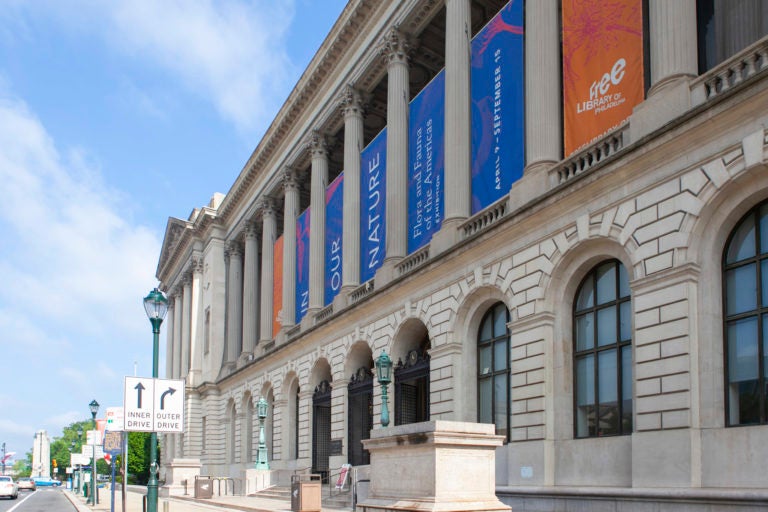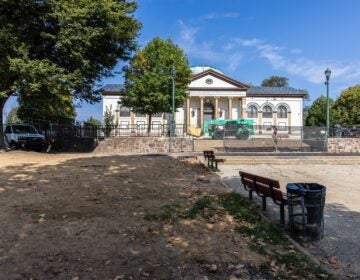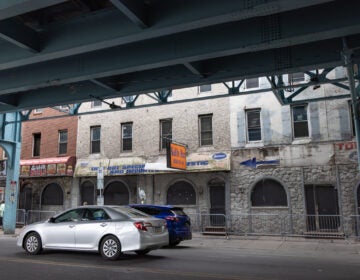Pew gives $1 million to the Free Library of Philadelphia to plan its future
The Pew Charitable Trusts also gave $850,000 to Drexel University to conserve Philadelphia's historical archive and make it accessible.

Free Library of Philadelphia (Miguel Martinez/Billy Penn)
The Free Library of Philadelphia will soon begin a strategic planning process to set the course for its future, funded by a $1 million grant from The Pew Charitable Trusts.
The city’s public library system is overdue for a strategic plan, said first deputy director Priscilla Suero, having not made one since the COVID-19 pandemic fundamentally changed how a city library system operates.
“We went from an institution where our engagement was person-to-person to now, this went digital, more things online,” Suero said. “Is that the place that we need to invest more in the future, or does it look like people are coming back in person and we could invest in that? It’s going to help us make some really informed decisions in how we build our infrastructure moving forward.”
The Pew grant will fund a community engagement element to help inform the Free Library’s course of action, soliciting input from library stakeholders including patrons, staff, donors, and city officials.
“We couldn’t build a strategic plan without community engagement and input,” Suero said. “We’re an institution that is created to serve them, so we need to hear from them to see what’s working and what’s not.”
Over the last few years, the Free Library has come under fire from its own staff, with complaints of discrimination and harassment. The complaints predate the pandemic, when staff pointed to instances of prejudice in an online survey in 2019.
The pandemic exacerbated complaints, particularly from its Black workers, about putting staff at risk as branches began to reopen. In 2020, the unionized library workers declared “no confidence” in the Free Library’s former director, Siobahn Reardon.
Suero was not working for the Free Library at the time of Reardon’s resignation in 2020, and would not say if the strategic planning process was prompted by specific workers’ concerns from three years ago. But she said the library will seek community and stakeholder input on issues around diversity, equity, and inclusion.
“I can’t even give you an assessment of that, honestly, which is why we need to do the strategic plan,” Suero said. “This is a sign of us moving forward. Hopefully, we will not be dwelling too much in the past, but looking at the opportunities in the future.”
Last year, library workers rallied at City Hall to demand funding to keep libraries open on more days of the week and for longer hours, saying library branches act as safe havens in communities experiencing gun violence.
The Pew Charitable Trusts has supported the library many times over the last 75 years. Senior Vice President Donna Frisby-Greenwood said this is a critical moment for the library system as lifestyles, public needs, and technology shift.
“We’ve got 54 different branches of our Free Library in 54 different neighborhoods. Every neighborhood might want something a little bit different” Frisby-Greenwood said. “This planning will give the Free Library an opportunity to hear from community members and to design programming at each of the 54 branches that is wanted and desired.”
As part of the same funding cycle, Pew is also granting $850,000 to Drexel University to support its stewardship of the city’s historical archive, known as the Atwater Kent Collection, which the university acquired from the former Philadelphia History Museum.
The funds will go toward a long list of actions for the maintenance and accessibility of the approximately 130,000-piece collection. Drexel Senior Vice Provost Rosalind Remer said the lion’s share of money will go toward hiring a registrar for the collection, and for conservation. She said there is a wide range of objects made from many different kinds of materials, each requiring its own conservation specialist.
“What makes this really important is we’re preserving Philadelphia’s history,” said Frisby-Greenwood. “We felt it was critically important to preserve the history that is in Philadelphia and then make that collection more widely available to citizens across the city.”
Under the legal agreement between Drexel and the city of Philadelphia finalized in Orphan’s Court, the university must make the objects available to the public, both in an online portal and through a loan system. Drexel has started cataloging and photographing the collection for digital browsing: about 3,000 objects are currently searchable.
Remer expects to have a system for loaning objects to museums and archival institutions up and running this fall. A system by which objects can be safely loaned to community institutions is likely a few years away.
Drexel is gearing up for two significant events for the Atwater collection. The first is a major exhibition in 2024 at the Pennsylvania Academy of the Fine Arts, to be called “Philadelphia Revealed: Unpacking the Attic,” which will display some objects never before seen publicly. The school is also preparing for the United States’ 250th anniversary — the semiquincentennial — when Remer expects many organizations will want to display historical objects.
“After our big exhibition next year, I think we’ll pivot to serving museums and other organizations that want to do displays for 2026. There’s just a ton of Revolution-related materials,” Remer said. “We can really serve in that role while we catch our breath and plan our community loan program.”
Right now, pieces from the Atwater collection can be viewed in a relatively modest exhibition at PAFA, “Seeing Philadelphia.”

Saturdays just got more interesting.
WHYY is your source for fact-based, in-depth journalism and information. As a nonprofit organization, we rely on financial support from readers like you. Please give today.







